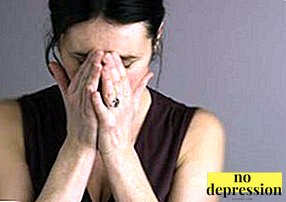Stress is an atypical situation that puts a person off balance, calm.
As a result there is an adaptation and struggle with the arisen problem. We consider the nature of stressful situations, their classification and the method for determining the level of stress.
Theories

Great contribution to the study of the topic made Hans Selye: the theory of stress, which he derived in the second half of the 20th century, laid the foundation for future scientists.
Selye was the person who identified the phases of stress and their development (we will talk about them in the section below).
After it, new perspectives on the issue took shape, the main ones being:
- Cognitive Theory of Stress. The essence of the theory is that a person evaluates a problem emotionally, subjectively. That each person individually considers the same problem.
- Psychodynamic theory. It implies the division of anxiety into two factors: external (direct reaction to external stimulus) and internal (waiting for trouble, anxiety as a property of character).
- Genetic theory. Based on heredity. According to the theory, the strength of a stressful situation and its appearance do not matter, because resistance, stability is determined by the genetics of a particular person.
Modern Theories stress combines the findings of scientists and psychiatrists.
They consider the concept of stress in a complex, taking into account not only genetics and innate temperament, but also the mental characteristics of the person, as well as her past empirical experience.
Hans Selye - the theory of stress:
Stressogenic factors affecting development

What can be caused by stress?
With the development of the level of civilization new external stimuli appear, such as car noise, social networks, industrial pollution, etc.
The factors that have a negative impact on the body are a huge number and it is impossible to list them all. It is much easier to classify them by key attributes.
Psychological
The following factors are by common for all the stresses that a person faces.
Character
Any stressful situation can be expanded by its nature.
- Frequency. How regular stress for the body. There are one-time troubles that a healthy person can easily endure. And a “black line” happens when a chain of problem situations collapses.
- Duration. Or rather, the length of the situation itself. Distinguish short, long and constant (chronic) duration. Minor problems quickly flow, such as a one-time conflict at work or a temporary wage delay.
For long stressful situations are events that strongly affect the psyche and can cause changes in the nature and outlook on things.
If passing problems are solved simply, long-term ones force a person to adapt and mobilize all the resources of the body. These include relocation, a protracted conflict in the work team, separation from a loved one, the death of a loved one.
 The most severe stress - chronic. This is when a person lives with a problem for a long time, and it has become an integral part of its existence - a chronic / congenital disease, poor relations with a partner (in which short-term scandals are also present), hard work.
The most severe stress - chronic. This is when a person lives with a problem for a long time, and it has become an integral part of its existence - a chronic / congenital disease, poor relations with a partner (in which short-term scandals are also present), hard work. - Impact force. In simple words - the force of impact on the psyche. One of the most severe stress is the death of a relative, treason, severe physical injury (loss of sight, hearing, limbs). Such problems can seriously loosen a person and leave a mark for life.
- Emotional pole. Stress can be either negative (the classic understanding of stress) or positive. In any case, a person has to adapt to the changes that have occurred.
But positive stress improves position, brings benefits in life. Examples: wedding, gym classes, public speaking.
Attitude
The second factor that illustrates individual perception of the event. For some, the conflict at work is a mere trifle, and someone goes into reflection, accompanied by apathy.

For some, the breakup of relationships is the collapse of a familiar life and terrible pain, emotional emptiness, while others see it as a release and an opportunity to fill life with something else.
In other words, perception of stress is subjective, and depends on the worldview, values and principles of a particular person.
Experience
Attitude to stress to a large extent depends on a person’s past experience and from the conclusions he drew from this experience.
For example, if a child as a child regularly performed on stage and his exits were accompanied by ovations, there is a great chance that in the future he will make an intelligent speaker.
But completely different storyif another child was laughed at or he spoke weakly. As a result, the fear of the scene was fixed.
Moreover, if the same type of stress arose regularly, then the person developed a fixed, stereotypical reaction to events.
For example, a teenager collided with hooligans on the street and gave up the slack. When it happens a few times, it just get used to retreat and pass facing the threat of physical conflict. And becoming an adult, under any such stress, will show cowardice.
Event Awareness

For example, a schoolboy was asked to make a PowerPoint presentation at home.
He never worked with this software, he just does not possess information to solve the problem. Accordingly, the stress is great.
But when he begins to look for educational materials on the Internet, he will try to make several slides - the gaps in knowledge will decrease, and he will be able to complete the task.
Or the person fell - and the arm hurts terribly. He is not a doctor and cannot diagnose the degree of injury himself. And therefore afraid - after all, there can be both a shift and a fracture.
"People are afraid of the unknown" - just about that. The less a person is aware of the problem and the methods of solving it, the greater the stress.
Professional
Most of the life of an adult person is related to work. And in work regularly there are characteristic problems for her. Causes of occupational stress:
- Job. It's about the work process itself.
Stress arises from overwork when the volume of tasks performed exceeds the capacity of the employee.
- Deadline. So called the deadline for work. And the less time left for the assigned task, the higher the emotional instability. In addition, there is a rush, a fuss, as a result of which multiple errors can occur.
 And if a person has “excellent syndrome” (fear of failure, fear of criticism), then deadline can cause great mental stress, especially in large-scale professional projects.
And if a person has “excellent syndrome” (fear of failure, fear of criticism), then deadline can cause great mental stress, especially in large-scale professional projects. - Independence. If the employee is accustomed to the role of the performer, then the lack of commands from above and the need to make the decision himself is unusual. And any unfamiliar situation is stress.
- Working conditions. If the environment in which a person works causes discomfort - concentration suffers, the body is in an alarming state. Two large categories of poor working conditions are divided: physical (bad odor in the room, uncomfortable tools, noise) and psychological (conflicting colleagues, boss).
- Relationship with colleagues. Interaction with the working team is an extremely important part of the work. It happens that it is more difficult to establish and maintain contact with colleagues than to cope with work duties.
If a person feels enmity, scornful attitude, mockery of his own person, then his professional qualities deteriorate.
Phases, stages and stages of flow
What stage does stress begin with? In the 20th century, Hans Selye was actively involved in stress research. There are three stages of stress on Selye:
- The first is reaction and mobilization. An unusual event happened - the body reacts. The brain analyzes the situation and wonders what resources will be needed to solve the problem. Adaptation to the new conditions starts.
- Resistance. When a person interpreted, formed a look at an event, the process of resisting stress is activated. How long an organism can endure a non-standard psychological load depends on two parameters: the strength of the impact (degree of power of stress) and the person’s ability to endure adversity.
- Depletion. Resist stress can only be a certain time - the resources of the body are not infinite. Psychologically strong, hardened people withstand a long load, but they can break down over time.
At this stage, the development of diseases, the deterioration of the internal organs, the formation of ulcers, heart disease.

How to determine the level?
Stress level shows degree of destructiveness of the problem for the psyche. If the stress is weak, then its influence on the physiology and psychology (beliefs, world view, attitude towards people) is insignificant or completely absent.
It is important to remember all the factors into which any stressful situation is subdivided, since various combinations are possible.

For example, failure itself may be small in strength, but protracted (stagnant constant conflict with a colleague).
And there may be a short time event but extremely powerful on the strength of the blow (car accident, dismissal, divorce).
What is the stress scale and what is it used for?
To determine the level of stress, psychology scientists Holmes and Ray made a table. They created a list of various life processes that in one way or another cause stress (both positive and negative).
Among them: the wedding, the disease, the death of a spouse, adultery, graduation. Each item is assigned stress strength number. For example, one of the strongest blows causes the death of a child - 85 points on the scale.
A vacation, a change in sleep or diet - almost imperceptible (up to 20 points each). Find a complete list can be on the Internet.
To determine the level of stress, the test should analyze their previous 12 months and enter the events that occurred to him from the list of Holmes and Ray.
Then add all points. Results are divided into three categories.:
- less than 150. The best option in which the risk of diseases in the body is minimal - 40%;
- from 150 to 300. The risk of disease increases to an interval of 40-60%;
- more than 300. The risk of getting sick is extremely high, almost one hundred percent (85-95%).

Everyone faces daily stress. Having knowledge of its classification, type, phases and stage, one can learn to determine the level of stress and successfully overcome it.

 The most severe stress - chronic. This is when a person lives with a problem for a long time, and it has become an integral part of its existence - a chronic / congenital disease, poor relations with a partner (in which short-term scandals are also present), hard work.
The most severe stress - chronic. This is when a person lives with a problem for a long time, and it has become an integral part of its existence - a chronic / congenital disease, poor relations with a partner (in which short-term scandals are also present), hard work. And if a person has “excellent syndrome” (fear of failure, fear of criticism), then deadline can cause great mental stress, especially in large-scale professional projects.
And if a person has “excellent syndrome” (fear of failure, fear of criticism), then deadline can cause great mental stress, especially in large-scale professional projects.

